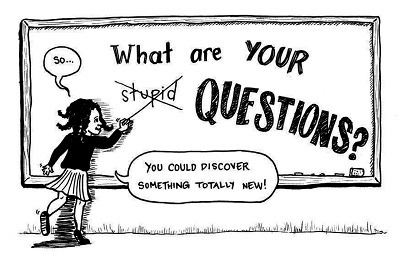Any Questions?
24 Jan 2024
“There’s no such thing as a stupid question.”
A person’s learning career lasts an entire lifetime whether within an academic institution, the workplace, or the myriad of experiences that help shape their personal development. The rapid progression of the world’s technological marvels has made it easier than ever to access information on countless subjects around the world. In turn, this has made it possible for anyone from anywhere to learn anything. Now more than ever, this idea has become increasingly relevant to a person’s learning process. Staying curious and asking questions is a foundational principle since it allows for the gears in our brains to turn and put pieces of a puzzle together.
Though it seems straightforward, knowing how to ask questions in a thoughtful, strategic way to get reliable answers is easier said than done. Growing up, teachers commonly encourage students to ask questions and would give constant reminders that: “there is no such thing as a stupid question,” However, flashbacks to past instructors giving annoyed glances or irritated tone of voices suggest otherwise. ‘Not so smart’ questions exist. Fortunately, there are glimmers of hope found in steps we can take to avoid becoming victims of this pitfall.
What makes a not so smart question?
To ask smart questions, it’s important to be mindful of what the opposing term means. A ‘not so smart’ question is often presented in an informationally lackluster way with them typically being too vague or broadly specified.
This is an example of a not so smart question on StackOverflow.

Note: The post has since been deleted. See below for the original entry.
I have linked the javascript code to my html code, but the script doesn't get applied.
Hey, I'm a complete beginner at javascript. I have generated codes for a model website that uses html, css, and javascript with chat gpt. I have properly linked my html code with css and javascript, but the effects that I anticipate from my javascript don't get applied to the html code. Can you review my code and tell me why? https://github.com/ilwoongchoi/javascripttest. above is my github repository for my model project. Thanks.
The given prompt is an example of this issue.
The user’s post lacks any significant information as to what they are trying to accomplish. The person mentions that they have used HTML, CSS and JavaScript, but fail to mention what their model website is trying to do. The lack of attention-to-detail in this post is a glaring issue as it makes it more challenging for potential helpers to give meaningful and targeted responses. In turn, the above post has been viewed 39 times with no replies and 4 downvotes.
Rather than simply requesting to review the code, the person who posted the question should have given more useful background information that would allow others to easily understand the goal in mind. For example, the OP could have talked about what their objectives are and what specifically “the effects they anticipate from javascript don’t get applied to the html code” are.
In a guideline article about asking ‘smart questions,’ Eric Raymond advised that the person asking must be explicit with what they want the responders to do to help. Doing this results in better chances of getting a useful response since it poses less of a time commitment to respondents. Given this, the user did not describe the goal they had in mind but instead chose to link their GitHub repository asking for others to review their code. As a result, the post hasn’t been well-received as demonstrated by the downvotes and its eventual deletion from StackOverflow.
What makes a smart question?

This is an example of a smart question on StackOverflow.
Eric Raymond says that a smart question must be both precise and informative. The above is a good example of this. The post’s author started by describing their goal, as well as what steps they have taken so far. They also discuss their progress and thought process concerning the program’s code. Although brief, the user discussed their problem clearly and received several replies that help answer their question. Notably, the post includes a follow-up note, which aligns with Raymond’s advice on his article.
Why should we do this too?
The ability to ask smart questions is not only a valuable knack to have within software engineering but in various facets of growth as a person as well. The way a question is posed is a major aim for improvement since it could mean the difference between getting meaningful responses to an important question or the disapproving sentiments and unhelpful replies that a poorly written one can get.